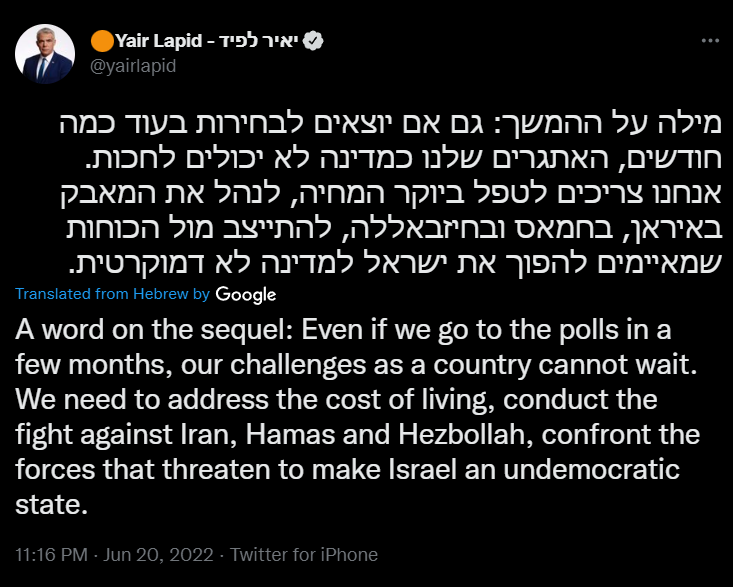A little over a year since forming government, Israel’s fragile coalition has collapsed, leading the country to a fifth election in just three years. Amid a series of setbacks, the heads of the coalition—Prime Minister Naftali Bennett and Foreign Minister Yair Lapid—announced on Monday that they would submit a bill next week to dissolve the Knesset.
The move paves the way for new elections to determine the next leader of the country. The vote is expected to take place in October owing to certain religious constraints. Meanwhile, Lapid will take over as interim PM to oversee the transition period.
2. There are many people, both in the coalition and opposition, who do not want Lapid to be prime minister even for this interim period. This includes Netanyahu, obviously, but also members of the coalition who may not want elections. There will be attempts to scuttle this plan.
— Yair Rosenberg (@Yair_Rosenberg) June 20, 2022
During a joint press conference in Jerusalem, the coalition heads said that they had run out of options after several rebellions by fellow lawmakers led to the government losing its majority in the Knesset.
Bennett attributed the decision to the inability of the coalition to pass a bill extending Israeli legislation to West Bank settlements. Until the coalition’s failure earlier this month, no government had voted against extending Israeli law to West Bank settlers. The Judea and Samaria Regulations Law was enacted in 1967 after Israel captured the West Bank from Jordan; since then, every government has been able to pass the law with widespread support across the political spectrum.
Bennett will go down in history as the one who turfed Netanyahu out of office and as the shortest-serving PM in Israeli history (12 months and a week). Lapid is to become Israel’s 14th PM, and may yet break Bennett’s record. But he’s going in to the election as PM which is major>
— Anshel Pfeffer אנשיל פפר (@AnshelPfeffer) June 20, 2022
However, the opposition, led by ex-PM Benjamin Netanyahu’s Likud party, which is in favour of expanding settlements, voted against the bill in an effort to defeat the ruling coalition. Two members of the coalition also voted against the law.
Saying that the decision to dissolve the coalition is meant to prevent Israel from “falling into chaos,” Bennett blamed the opposition for abandoning national interests in favour of political gains. “Unlike the opposition, which turned Israel’s security into a political pawn, I refused to harm Israel’s security for even one day,” the embattled PM said.
“We did our utmost to preserve this government,” Bennett claimed, adding, “Believe me, no stone was left unturned—for the good of our beautiful country and for you, the citizens of Israel.”
Referring to the ideologically diverse nature of the coalition, Bennett said, “We proved you could put disagreements aside for the sake of the state.” He asserted that his government was a “good government” that worked to maintain Israel’s interests. He noted that his administration provided stability amid political turmoil and prevented a new Iran nuclear deal without harming relations with the United States.

Lapid concurred with Bennett and said that the decision to dissolve the parliament was a “responsible” move, one that “put the country before […] personal interest.” He added, “What has happened in the past few days, what has happened here tonight, is further proof that the Israeli system is in need of serious change and major repairs.”
“What we need to do today is go back to the concept of Israeli unity. Not to let dark forces tear us apart from within. To remind ourselves that we love one another, love our country,” Lapid later tweeted.
Defence Minister Benny Gantz responded to the announcement by saying he believes “the government has done a very good job [and] it is a shame that the country must be dragged to elections.” Justice Minister Gideon Sa’ar blamed “the irresponsibility of certain coalition lawmakers” for causing the crisis. “The goal in the coming election is clear—preventing Netanyahu’s return to power and enslaving the state to his interests,” he remarked.
Meanwhile, ex-PM Netanyahu, who is under trial for corruption charges, celebrated the coalition’s imminent dissolution. He said that “everyone is smiling” at the demise of the government, which “gave in” to terror and “caused the loss of personal security, raised the cost of living, and, most importantly, caused the loss of national pride.”
2/ Elex 1, April ’19. Common wisdom is easy re-election win for Bibi a la 2012. No real opposition/alternative. But then Gantz shows up, unites w Lapid & form Blue-White. Liberman defects from Bibi camp. Bennett doesn’t pass threshold. Right throws away 7-9 seats. 60-60 deadlock.
— Neri Zilber (@NeriZilber) June 14, 2022
He condemned Bennett for claiming that the decision to dissolve the coalition was an act of selflessness and accused the PM of “brainwashing” Israelis. Netanyahu claimed that if he came to power, he would form a “wide” government that would “return the national pride” that Israel lost under the current government. He also claimed that his government would negotiate more normalisation deals with Arab countries as part of the Abraham Accords, which saw the United Arab Emirates, Bahrain, Sudan, and Morocco establish diplomatic relations with Israel.
Apart from its failure to pass the Judea and Samaria law, the coalition has suffered a series of major setbacks. Last week, Nir Orbach, a member of Bennett’s Yamina party, quit the coalition over internal disagreements. The move prompted Bennett to say that his government might be on the verge of collapse, as the coalition became a minority, with 59 seats in the 120-member Knesset.
Similarly, earlier this month, the government failed to approve the nomination of Yamina Member of Knesset (MK) Matan Kahana as Religious Minister after rebel MK Idit Silman voted against it. Silman, who is also a member of Yamina, quit the coalition in April after objecting to the government’s decision to allow bread to be brought into public hospitals, which she argues goes against Jewish religious law.
A month later, Meretz MK Ghaida Rinawie Zoabi exited the coalition over the police’s assault of mourners attending the funeral of Al Jazeera journalist Shireen Abu Akleh, who was murdered by Israeli security forces according to the network. Zoabi later returned to the coalition over fears that her resignation would allow the Likud party to come to power.
Israel’s ruling coalition, which is an ideologically incompatible patchwork of parties from the left, right, and centre, was formed in June last year to end Netanyahu’s 12-year stint as PM.

